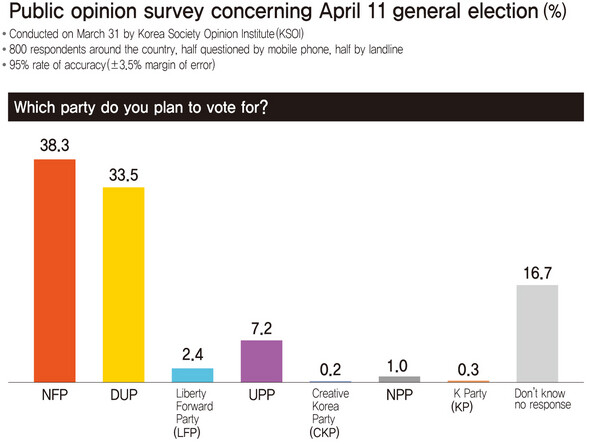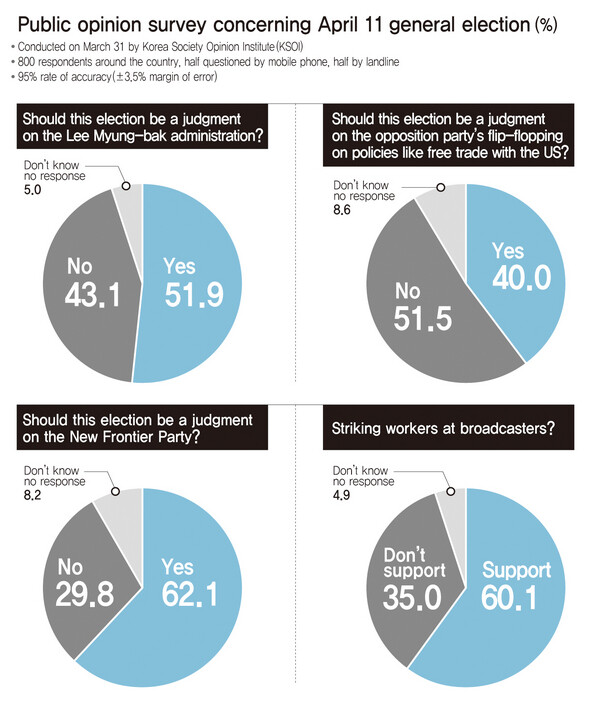hankyoreh
Links to other country sites 다른 나라 사이트 링크
Opposition makes slight comeback in general election advance poll
Voter turnout expected to be high in closely-fought election

By Son Won-je, staff writer
The results of a nationwide opinion survey conducted Saturday by the Hankyoreh and the Korea Society Opinion Institute show something of a comeback for the opposition as voting draws nearer. These changes may be attributable to the effects of the opposition election alliance and the Lee Myung-bak administration’s illegal civilian surveillance scandal.
When asked which political party they supported, 38.8% of respondents named the New Frontier Party (NFP) and 33.5% the Democratic United Party (DUP). Next in line were the Unified Progressive Party (UPP) with 7.2%, the Liberty Forward Party with 2.4%, the New Progressive Party with 1.0%, the Korea Vision Party with 0.3%, and the Creative Korea Party with 0.2%.
While the NFP was the party with the highest support rate, combined support for the DUP and UPP was higher, at 40.7%. This contrasts with results of a poll conducted one month earlier by the Hankyoreh that showed the two parties with respective support rates of 32.9% and 3.1%, putting them behind the NFP’s 38.2% even when combined.
Based on the findings, analysts estimated that the NFP would come away with around 24 to 25 proportional representation seats in the parliamentary election, and the DUP with around 22 to 23. With its current support levels, the UPP would pick up five or six.
The 54 proportional representation seats account for 18% of the 300 total National Assembly seats. They are distributed through recalculation of the voting rates for the different parties with five or more local constituency seats or a support rate of 3% or more.
The unified opposition candidate was also supported by 45.9% of respondents in a two-way race scenario with an NFP candidate. 40.8% said they would support the NFP candidate.
In particular, unified opposition candidate support rates were higher than average in the greater Seoul area. The opposition candidate led the NFP candidate by 48.1% to 41.3% in Seoul and 46.9% to 40.3% in Gyeonggi/Incheon. And while the NFP candidate led the opposition candidate by 44.8% to 40.6% in the Busan/Ulsan/South Gyeongsang region, an NFP stronghold, which is being mentioned alongside greater Seoul as a major battleground, the margin was not large.
Some analysts suggested that the vote-rallying effects of candidate consolidation between the DUP and UPP may be strongest in closely contested areas.
The survey also found higher rates of agreement on issues raised by the opposition. A total of 51.9% said they agreed with the characterization of the general election as a trial of the administration and ruling party’s incompetence and corruption, compared to 43.1% who disagreed. Also, 51.5% said they disagreed with the characterization of the election as a trial of the opposition for flip-flopping on major policies such as free trade with the US, compared to 40.0% who agreed.

Meanwhile, 62.1% of respondents said the NFP led by Park Geun-hye was a target for judgment in the election, compared to 29.8% who answered that it was not.
For every region, a larger number of voters saw the NFP as a target for judgment. This included the Daegu/North Gyeongsang region, where 50.5% of respondents agreed. The percentage was also above the average at 66.0% in Busan/Ulsan/South Gyeongsang province. On the whole, the figures indicate that the election is shaping into a trial of the administration and ruling party.
Some 67.4% of respondents said the illegal civilian surveillance scandal, which has recently emerged as a major election issue, would have a negative impact on the ruling party, with 22.6% saying it would be “very negative” and 44.7% saying it would be “somewhat negative.” The overall rate was more than double the 25.0% who said it would have no impact.
Regarding the handling of the surveillance scandal, 49.7% agreed with the need to wait for final results from the prosecutors’ investigation, while 46.5% expressed the view that President Lee Myung-bak should state the truth on the issue.
Analysts predicted a major ripple effect from developments in the case, since those who advised waiting for results were only temporarily withholding judgment.
The survey showed 71.5% of respondents intended to vote. The rates were lower for respondents in their twenties, thirties, and forties, at 56.5%, 64.3%, and 68.0% respectively, compared to 78.0% for those in their fifties and 90.2% for those sixty and older. The results suggest that as in past elections, the turnout among members of the so-called “20--40 generation” will have a decisive impact.
Supporters of all parties showed roughly equal intentions to vote, which analysts interpreted as indicating strong rallying effects among the support bases for each party.
The survey examined 800 men and women aged 19 and older from around the country through a random dialing method using equal numbers of home and mobile phone numbers. The sample error was ±3.5 percentage points with a 95% confidence level.
Please direct questions or comments to [english@hani.co.kr]
Editorial・opinion
![[Column] Season 2 of special prosecutor probe may be coming to Korea soon [Column] Season 2 of special prosecutor probe may be coming to Korea soon](https://flexible.img.hani.co.kr/flexible/normal/500/300/imgdb/original/2024/0426/3317141030699447.jpg) [Column] Season 2 of special prosecutor probe may be coming to Korea soon
[Column] Season 2 of special prosecutor probe may be coming to Korea soon![[Column] Park Geun-hye déjà vu in Yoon Suk-yeol [Column] Park Geun-hye déjà vu in Yoon Suk-yeol](https://flexible.img.hani.co.kr/flexible/normal/500/300/imgdb/original/2024/0424/651713945113788.jpg) [Column] Park Geun-hye déjà vu in Yoon Suk-yeol
[Column] Park Geun-hye déjà vu in Yoon Suk-yeol- [Editorial] New weight of N. Korea’s nuclear threats makes dialogue all the more urgent
- [Guest essay] The real reason Korea’s new right wants to dub Rhee a founding father
- [Column] ‘Choson’: Is it time we start referring to N. Korea in its own terms?
- [Editorial] Japan’s rewriting of history with Korea has gone too far
- [Column] The president’s questionable capacity for dialogue
- [Column] Are chaebol firms just pizza pies for families to divvy up as they please?
- [Column] Has Korea, too, crossed the Rubicon on China?
- [Correspondent’s column] In Japan’s alliance with US, echoes of its past alliances with UK
Most viewed articles
- 1‘We must say no’: Seoul defense chief on Korean, USFK involvement in hypothetical Taiwan crisis
- 2[Column] Season 2 of special prosecutor probe may be coming to Korea soon
- 3N. Korean delegation’s trip to Iran shows how Pyongyang is leveraging ties with Moscow
- 4Amnesty notes ‘erosion’ of freedom of expression in Korea in annual human rights report
- 5Korea sees more deaths than births for 52nd consecutive month in February
- 6[Reportage] On US campuses, student risk arrest as they call for divestment from Israel
- 7[Editorial] New weight of N. Korea’s nuclear threats makes dialogue all the more urgent
- 8‘Weddingflation’ breaks the bank for Korean couples-to-be
- 9Division commander ordered troops to enter raging flood waters before Marine died, survivor says
- 10[Editorial] Korea’s surprise Q1 growth requires objective assessment, not blind fanfare